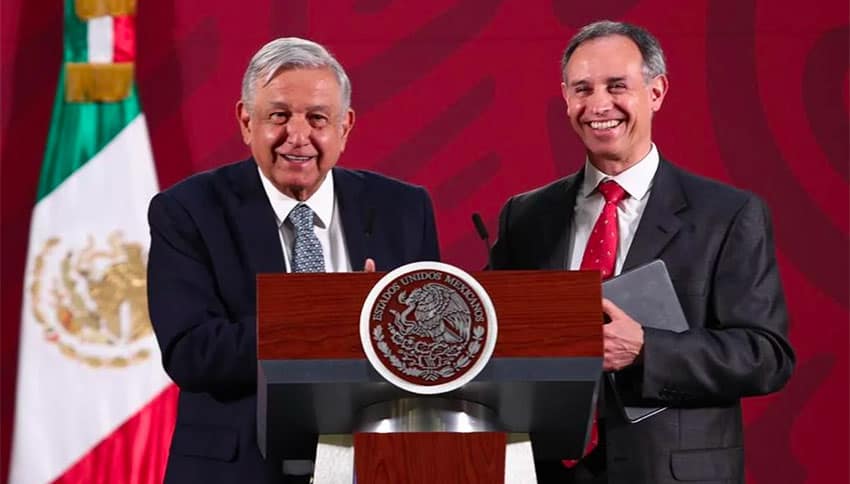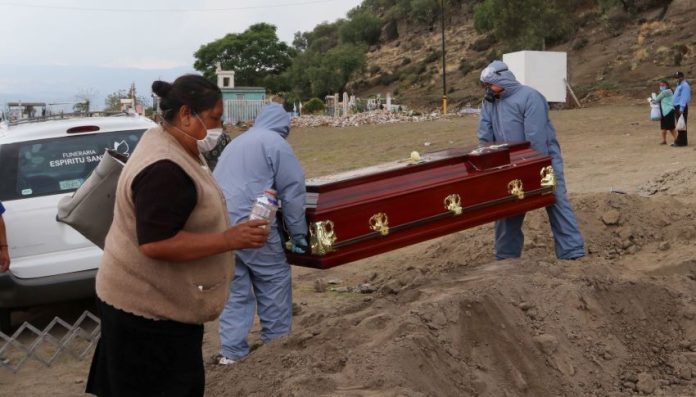About 190,000 deaths could have been avoided in Mexico last year if the government managed the coronavirus pandemic better, according to a study commissioned by the World Health Organization (WHO).
Entitled Mexico’s Response to Covid-19: A Case Study, the study by the Institute for Global Health Sciences (IGHS) notes that there were 43% more deaths in Mexico in 2020 compared to the average for 2018 and 2019.
Carlos del Río, a professor of medicine at Emory University and one of the study’s author’s, told the news website Animal Político that among 39 countries analyzed, Mexico had the fourth highest excess death rate behind only Peru, Ecuador and Bolivia.
He said the average excess death rate in 2020 for the 39 analyzed countries – among which were also the United States, the United Kingdom, Spain, France, Russia, Thailand, Israel, Brazil, Chile and Colombia – was 17.3%.
“If Mexico had had a similar performance [in managing the pandemic] to the other countries where the excess mortality was 17% [on average], there would have been 190,000 fewer deaths,” del Río said.
That figure refers to Covid-19 deaths as well as fatalities caused by other health problems that weren’t treated adequately, or at all, due to the pandemic.
Del Río noted that the United States – which easily has the highest official Covid-19 death toll in the world – had an excess mortality rate of just 20% last year, less than half that of Mexico.
The study notes that there were 326,609 excess deaths in Mexico in 2020, according to official data. That figure is 2.6 times the official Covid-19 death toll for 2020, which stood at 125,807 at the end of last year.
The majority of last year’s excess deaths are attributable to Covid-19 – the federal government acknowledged late last month that Mexico’s true Covid-19 death toll for last year and the first three months of 2021 was above 321,000 – but a significant number were caused by the lack of treatment for, or diagnosis of, other diseases, according to the WHO-commissioned study.
It noted that, according to Health Ministry data, the diagnosis of malnutrition, heart disease, uterine cancer, diabetes and breast cancer was down 56%, 45%, 34%, 27% and 20%, respectively, in 2020.
Del Río asserted that the federal government’s management of the pandemic, which has already been widely criticized, was a failure.

“One of the main flaws is leadership. When you have a country like the United States with poor leadership and strong institutions, the performance [in managing the pandemic] is bad. When you have a country with poor leadership and weak institutions as is the case in Mexico, the performance is even worse,” he said.
The IGHS case study asserts that Mexican authorities failed to take decisions related to the management of the pandemic in a timely manner. The health experts who conducted the study were critical of the relegation of the government’s General Health Council to a secondary role in the management of the crisis and censured the government for not consulting with outside experts before taking key decisions.
The study asserted that there was a lack of understanding on the part of government at the beginning of the pandemic both about the threat posed by the coronavirus and the collaboration that would be required between authorities to effectively combat the threat.
It also criticized the government for recommending, at the start of the pandemic, that people sick with Covid-19 not go to hospital until their symptoms were serious so as to avoid saturating the health system. That advice contributed to the high death rate, the study said, noting that an estimated 58% of Covid-19 fatalities occurred outside hospitals.
However, even if patients got to hospitals in a timely manner, there was no guarantee that they would get the treatment they required.
The capacity of the Mexican health system to respond to the pandemic has been limited, del Río said, even though the federal government scrambled to increase capacity at many hospitals.
Another problem, the health expert told Animal Político, is that the government’s messaging during the pandemic has been poor.
“How many times has it said that this is going to end?” he said, apparently referring to President López Obrador’s repeated claims that the pandemic was under control or was being brought under control.
“It still hasn’t forcefully recommended masks,” del Río added.
The study was also critical of the government’s lack of economic support for citizens that, if provided, would have helped them comply with lockdown measures.
(Many people live day to day in Mexico and therefore have to go out to work every day to provide for themselves and their families.)
The health experts also criticized the government for not testing more widely. Mexico’s low testing rate – it ranked 155th out of 203 countries for per capita testing as of last month – hindered the government’s capacity to identify cases, isolate people and therefore limit transmission of the virus.
Del Río said the prevalence of chronic diseases such as hypertension, diabetes and obesity has also contributed to Mexico’s high death rate.
As of Sunday, Mexico had officially recorded 2.28 million confirmed cases, while the Covid-19 death toll stood at 209, 338, the third highest total in the world.
The news agency Bloomberg has rated Mexico the worst country to be in during the coronavirus pandemic out of 53 nations analyzed. Mexico retained that unenviable position in Bloomberg’s latest Covid Resilience Rankings, which were published in late March.
Source: Animal Político (sp)
